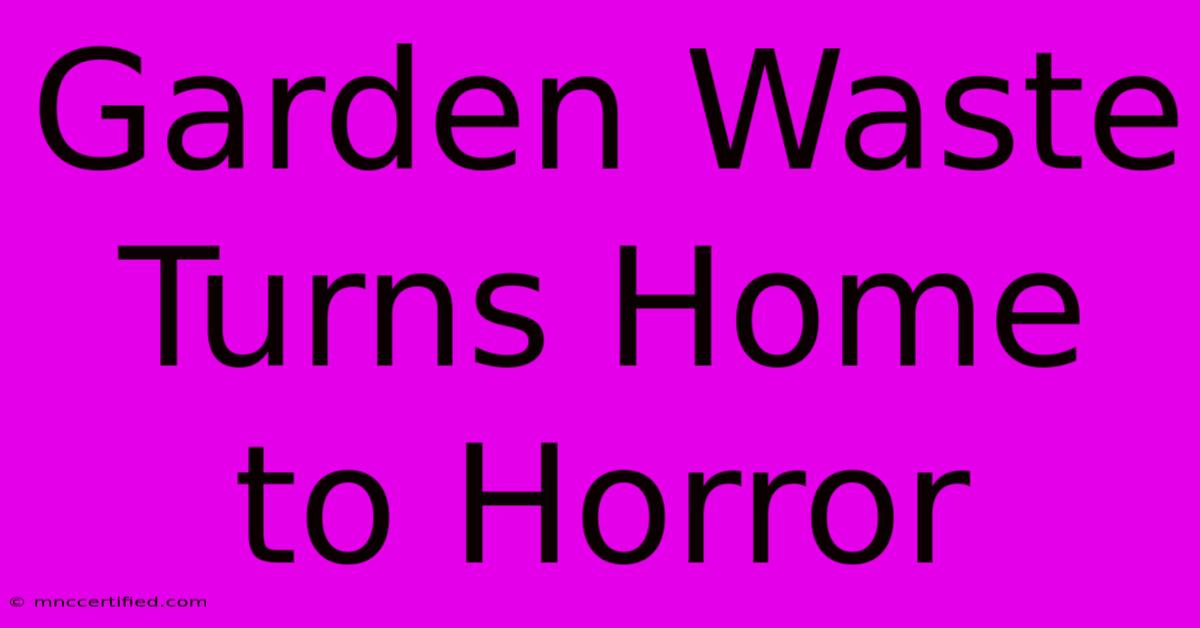Garden Waste Turns Home To Horror

Table of Contents
Garden Waste Turns Home to Horror: A Guide to Preventing Unwanted Pests and Diseases
Turning your garden waste into compost is a fantastic way to enrich your soil and reduce landfill waste. However, improper handling can transform your compost heap from a haven of healthy decomposition into a breeding ground for unwanted pests and diseases. This article explores the potential horrors lurking within your garden waste and provides practical steps to prevent them.
The Horrors Hiding in Your Compost: Pests and Diseases
A seemingly innocuous pile of leaves and grass clippings can quickly become a haven for various unwelcome guests. Here are some of the potential "horrors" you might encounter:
1. Insect Infestations:
- Flies: Fruit flies, house flies, and other species are attracted to decaying organic matter. Their presence is not only unpleasant but can also spread diseases.
- Moths: Pantry moths and other types can infest stored grains and seeds, often finding their way into compost heaps containing food scraps.
- Weevils: These beetles can infest stored seeds and grains, making their way into compost and potentially damaging nearby plants.
- Slugs and Snails: While beneficial in moderation, a large population in your compost can lead to infestations in your garden.
2. Rodent Problems:
Rats and mice are attracted to the food scraps and shelter provided by a poorly managed compost heap. These rodents can carry diseases and damage property.
3. Disease Transmission:
Improper composting can lead to the survival of plant pathogens. These can contaminate your healthy plants when you use the compost, leading to crop failure. Certain weeds can also survive the composting process and spread throughout your garden.
Preventing the Horror: Best Practices for Safe Composting
The key to avoiding these "horrors" is proper composting techniques. Here's how to create a safe and effective system:
1. Proper Material Selection:
- Avoid: Meat, dairy, oily foods, diseased plants, and invasive weeds. These attract pests and diseases and may not decompose properly.
- Include: Brown materials (twigs, leaves, shredded paper) and green materials (grass clippings, vegetable scraps) in a balanced ratio.
2. Build a Well-Ventilated Compost Bin:
Adequate airflow is crucial for decomposition and helps prevent anaerobic conditions that encourage pest infestations. Consider a bin with plenty of air vents or a three-bin system for efficient composting.
3. Maintain Proper Moisture Levels:
The compost should be moist but not soggy. Too much moisture creates anaerobic conditions, while too little hinders decomposition. Regularly check the moisture level and adjust as needed.
4. Turn Your Compost Regularly:
Turning the compost aerates it, speeds up decomposition, and helps to prevent pest build-up. Aim for at least once a week, more frequently in warmer weather.
5. Location, Location, Location:
Place your compost bin away from your house, walkways, and other structures to prevent pest infestations from spreading. Consider using a sturdy, enclosed bin to minimize unwanted access.
6. Monitor Regularly:
Regularly inspect your compost heap for signs of pests or diseases. If you spot anything unusual, take action immediately. This may involve removing affected materials or using appropriate pest control methods.
Turning Your Garden Waste into Gold: Not Horror
By following these best practices, you can transform your garden waste into valuable compost without facing any unwanted "horrors." Remember, proper composting is an essential part of sustainable gardening and a key step in creating a healthy and thriving garden. By taking proactive measures, you can enjoy the benefits of composting without the unpleasant side effects. So, ditch the horror and embrace the gold!

Thank you for visiting our website wich cover about Garden Waste Turns Home To Horror. We hope the information provided has been useful to you. Feel free to contact us if you have any questions or need further assistance. See you next time and dont miss to bookmark.
Featured Posts
-
Seven Game Ban For Tottenhams Bentancur Racism Allegation
Nov 18, 2024
-
Fighting Illini Re Enter Top 25
Nov 18, 2024
-
Illinois Football Updated Rankings
Nov 18, 2024
-
A12 Colchester Closed Northbound And Southbound Blocked
Nov 18, 2024
-
Insurance Claim Attorneys Near Me
Nov 18, 2024